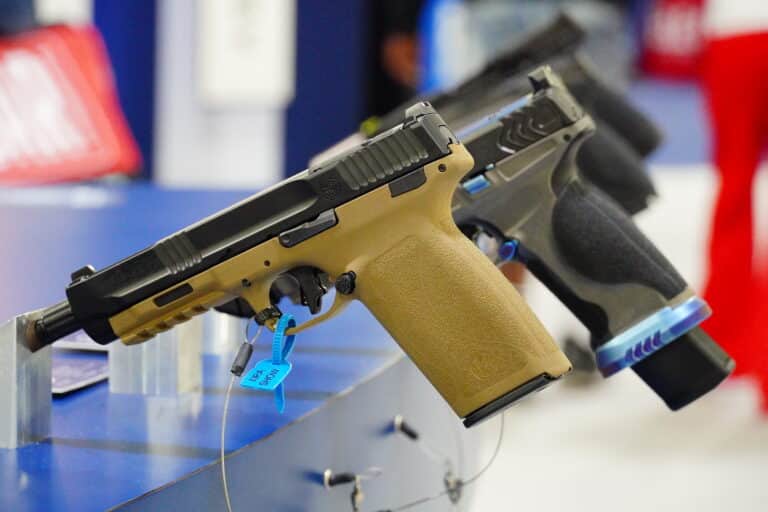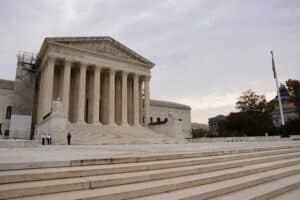The government can permanently disarm someone with prior convictions for financial felonies, a federal appeals court has ruled.
On Monday, a three-judge panel for the Second Circuit Court of Appeals unanimously rejected a New York man’s as-applied challenge to restore his Second Amendment rights despite a pair of decade-old bank and tax fraud convictions. Though the plaintiff argued that the federal felon-in-possession ban should not apply to someone with only non-violent offenses, the panel ruled that the Second Amendment allows Congress to categorically ban all felons from having guns–relying largely on discriminatory historical laws that barred blacks, Catholics, and native Americans from owning firearms.
“Because legislatures at or near the Founding had the authority to pass laws disarming large classes of people based on status alone, we conclude that the Second Amendment does not bar Congress from passing laws that disarm convicted felons, regardless of whether the crime of conviction is nonviolent,” Judge Gerard Lynch wrote in Zherka v. Bondi.
The ruling expands the ongoing circuit split among lower courts over whether non-violent individuals can overcome lifetime disarmament. It aligns the Second Circuit with the Fourth, Eighth, Ninth, Tenth, and Eleventh Circuits in holding the government can lawfully disarm all felons. Meanwhile, the Fifth and Sixth Circuits have suggested the opposite, and the Third Circuit has explicitly struck down the federal ban as applied to one individual non-violent convict, leaving a nationwide gap in the most commonly enforced federal gun law that only the Supreme Court can resolve.
The Second Circuit’s foray into the legal divide stems from a lawsuit filed by Selim Zherka, a New York-based former strip club owner and real estate developer with a large social media following, who now sells dating courses. Zherka was federally indicted in 2014 for an alleged scheme that involved receiving hundreds of millions of dollars from fraudulent bank loan applications, filing numerous false tax returns, and witness tampering. He ultimately pled guilty to one count of conspiracy in 2015 and was sentenced to 37 months in prison. The court also ordered him to pay nearly $8.5 million in fines, restitution, and forfeiture.
He completed his prison sentence in 2017, and his supervised release ended in May 2020.
Later that same year, he sued the Attorney General to regain his gun rights. He argued that the federal felon-in-possession ban is unconstitutional as applied to non-violent felons like him and that the government can only disarm him after an individualized finding of dangerousness. A district court judge dismissed his case in 2022, and the Second Circuit agreed to hear his appeal.
Reviewing his claims, the panel first conceded, over the protestations of the Department of Justice (DOJ), that Zherka is part of “the people” covered under the text of the Second Amendment.
“The Supreme Court’s broad definition of ‘the people’ in Heller, moreover, betrays no intent to carve certain classes from ‘the people’ only in the context of the Second Amendment,” Lynch, a Barack Obama appointee, wrote. “We will neither jeopardize the scope of other rights nor demean the status of Second Amendment rights by narrowly circumscribing the classes of Americans to whom those rights belong.”
Turning to the historical analysis, however, the panel accepted the federal government’s invocation of bigoted Founding-Era laws that disarmed Catholics, blacks, and Native Americans as valid analogues of the modern gun ban for convicted felons.
“English, American colonial, and early American histories abound with examples of laws demonstrating that legislatures had broad authority to regulate firearms, including by disarming large classes of people based on their status alone,” Lynch wrote. “Religious minorities, political dissenters, Native Americans, and persons of color were among the disfavored groups that historical legislatures disarmed based on a perception that persons in those categories were inherently dangerous or non-law-abiding.”
The panel, which included a Jimmy Carter and Joe Biden appointee, acknowledged that such laws might be “offensive to contemporary moral sensitivities” or even unconstitutional today. But it said that the laws were nevertheless valid for the Second Amendment test required by Bruen because they demonstrated that Founding-Era legislatures had the authority to use status as grounds for disarmament.
“Moreover, those laws demonstrate that legislative disarmament did not always turn on a particularized finding of a propensity for violence,” Lynch wrote. “Instead, legislatures could disarm classes of people that they perceived as dangerous, without any judicial scrutiny of the empirical basis for that perception.”
Therefore, the panel concluded that the historical record supported a finding that the federal felon ban is both facially constitutional and unsusceptible to any as-applied challenges. It said any exceptions to the lifetime ban would have to be created by Congress rather than the courts. It cited Congress’s creation of Section 925(c) ‘s administrative process for the Attorney General to restore individual gun rights, and its later decision not to fund the program, as an example.
“As the historical record discussed above demonstrates, the courts have left the decision to establish an exemption structure, and the decision not to fund one, to the sound discretion of the legislative branch,” Lynch concluded. “There is no historical basis upon which we could declare Section 922(g)(1) unconstitutional because it sweeps too broadly. Zherka’s as-applied challenge, therefore, fails.”
The outcome sets up another potential showdown over the issue of non-violent felon gun rights at the Supreme Court. Zherka issued a press release after the Second Circuit’s decision in which he pledged to appeal the ruling, comparing his legal fight to the “political witch hunt” against President Donald Trump.
“I respect the Judges but strongly disagree with their decision,” Zherka said. “I’m taking this to the Supreme Court. And God willing, a victory there will not only restore my rights–it will set a precedent that protects President Trump and every other American from being railroaded.”
Whether he will find success in that endeavor remains an open question. Despite the growing circuit split over the question, the Supreme Court has continued to reject non-violent felon Second Amendment cases in recent weeks.
President Trump may also not be on his side in this fight. His DOJ has urged the justices to leave the issue alone in numerous court filings despite its directive to defend and expand Second Amendment rights.
The Department of Justice did not respond to a request for comment.






